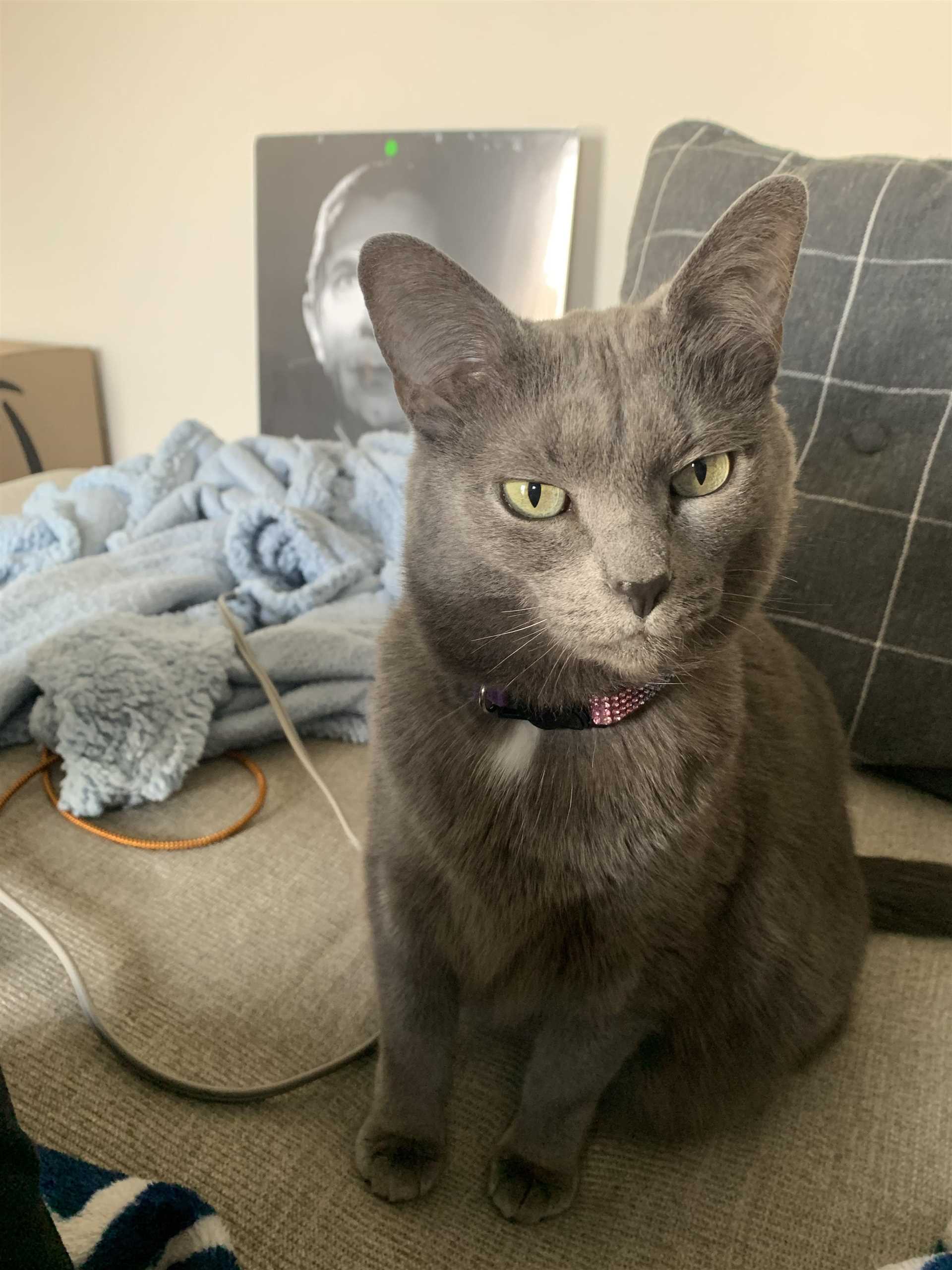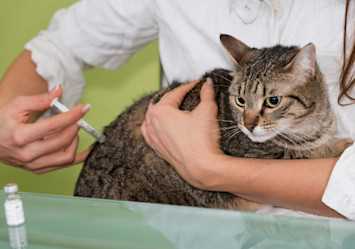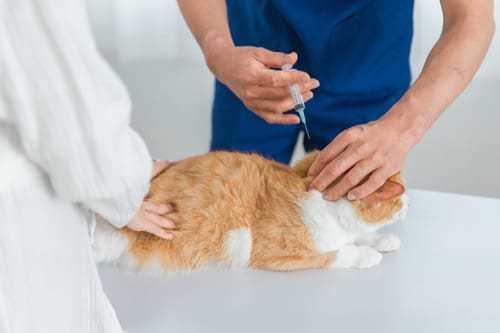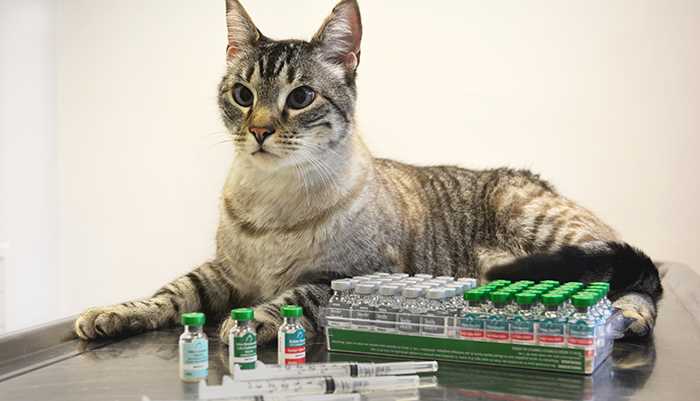After receiving a vaccination, some felines might experience mild reactions. Symptoms can include lethargy, slight fever, or localized swelling at the injection site. These occurrences are typically temporary and resolve within a few days. It’s important to monitor for any unusual behavior following the procedure.
In rare instances, more severe responses can arise. Allergic reactions, though uncommon, can present with symptoms such as difficulty breathing, vomiting, or swelling of the face. If any of these signs appear, immediate veterinary attention is necessary. Keeping an eye on your furry friend post-vaccination is key for their well-being.
Consulting with a veterinarian prior to the vaccination can provide tailored guidance based on individual health status and history. Ensuring your companion is healthy before any medical intervention is always a wise choice. Staying informed about potential reactions can help you feel prepared and confident in your pet’s care.
Understanding Reactions to Vaccines
Vaccines can sometimes lead to mild reactions in our furry companions. Symptoms might include slight fever, lethargy, or localized swelling at the injection site. These effects are generally short-lived and resolve within a day or two.
Monitoring for Adverse Effects
It’s important to observe for any unusual behavior post-vaccination. If my energy levels drop significantly or if there are signs of distress, it’s wise to consult a veterinarian. They can provide guidance tailored to the specific situation.
Long-term Health Benefits

While there may be temporary discomfort, the long-term protection gained from these vaccinations greatly outweighs the risks. Keeping up with vaccinations is crucial for overall health, safeguarding against severe diseases.
For those curious about other potential hazards, check out this link on are pom daisies toxic to cats. Staying informed helps ensure a safe and healthy environment for us felines!
Understanding the Ingredients in Vaccines
It’s crucial to know what goes into vaccines. They typically contain inactivated or attenuated viruses, which are essential for building immunity. These components stimulate the immune system without causing disease.
Common Ingredients

Proteins from the virus are often included to enhance the immune response. Adjuvants might also be present; these substances help boost the effectiveness of the vaccine. Preservatives, like thimerosal, are sometimes used to prevent contamination, although many modern formulations are preservative-free.
Possible Reactions
While most ingredients are safe, some pets may experience mild reactions due to individual sensitivities. Monitoring for any unusual behavior post-vaccination is key. Consult with a veterinarian if there are concerns about ingredients or reactions.
Common Side Effects Observed After Vaccination
After receiving a vaccination, some of my furry friends may experience mild reactions. These are generally not serious and resolve quickly.
- Local Reaction: Swelling or tenderness at the injection site is common. It usually disappears within a few days.
- Fever: A slight increase in body temperature can occur, often lasting no more than a day.
- Lethargy: Feeling a bit more tired than usual is normal. Rest is important during this time.
- Decreased Appetite: Some companions might show less interest in food for a short period.
- Vomiting or Diarrhea: A few may experience mild gastrointestinal upset. Monitoring for hydration is key.
Most of these effects are temporary. If symptoms persist or worsen, contacting a veterinarian is advised for further guidance.
Identifying Allergic Reactions in Cats

Watch closely for signs of allergic responses after any vaccination. Common indicators include swelling at the injection site, excessive scratching, or unusual vocalizations. If you notice any of these behaviors, it’s time to act.
Symptoms to Monitor
Pay attention to these specific symptoms:
- Redness or swelling around the area where the vaccine was administered
- Hives or welts on the skin
- Vomiting or diarrhea
- Difficulty breathing or rapid panting
- Sudden lethargy or disorientation
When to Seek Veterinary Help
If any severe symptoms arise, such as difficulty breathing or persistent vomiting, contact a veterinarian immediately. Early intervention can prevent complications.
| Symptom | Action |
|---|---|
| Swelling or redness | Monitor for 24 hours; consult vet if worsening |
| Hives | Report to vet; antihistamines may be needed |
| Vomiting/diarrhea | Keep hydrated; vet visit if severe |
| Difficulty breathing | Emergency vet visit required |
| Lethargy | Observe; vet consultation if prolonged |
Taking these precautions can help ensure health and well-being after any vaccination. Always trust your instincts and prioritize your furry friend’s safety.
When to Consult a Veterinarian After Vaccination
If my human notices unusual behavior or symptoms following my vaccination, they should reach out to a veterinarian without hesitation. Signs like excessive lethargy, persistent vomiting, or difficulty breathing warrant immediate attention.
Behavioral Changes to Monitor

My human should keep an eye on me for any sudden changes in appetite or energy levels. If I refuse food for more than 24 hours or seem unusually withdrawn, it’s time to consult a professional. Any signs of discomfort, such as whining or hiding, should also raise a red flag.
Physical Symptoms to Watch For
Swelling at the injection site is common but should not persist beyond a few days. If the area feels warm, appears red, or if I develop a fever exceeding 103°F, my human must contact a vet. Additionally, any signs of an allergic reaction, like hives or facial swelling, require urgent care.
After receiving a vaccination, some felines might experience mild reactions. Symptoms can include lethargy, slight fever, or localized swelling at the injection site. These occurrences are typically temporary and resolve within a few days. It’s important to monitor for any unusual behavior following the procedure.
In rare instances, more severe responses can arise. Allergic reactions, though uncommon, can present with symptoms such as difficulty breathing, vomiting, or swelling of the face. If any of these signs appear, immediate veterinary attention is necessary. Keeping an eye on your furry friend post-vaccination is key for their well-being.
Consulting with a veterinarian prior to the vaccination can provide tailored guidance based on individual health status and history. Ensuring your companion is healthy before any medical intervention is always a wise choice. Staying informed about potential reactions can help you feel prepared and confident in your pet’s care.
Understanding Reactions to Vaccines
Vaccines can sometimes lead to mild reactions in our furry companions. Symptoms might include slight fever, lethargy, or localized swelling at the injection site. These effects are generally short-lived and resolve within a day or two.
Monitoring for Adverse Effects
It’s important to observe for any unusual behavior post-vaccination. If my energy levels drop significantly or if there are signs of distress, it’s wise to consult a veterinarian. They can provide guidance tailored to the specific situation.
Long-term Health Benefits

While there may be temporary discomfort, the long-term protection gained from these vaccinations greatly outweighs the risks. Keeping up with vaccinations is crucial for overall health, safeguarding against severe diseases.
For those curious about other potential hazards, check out this link on are pom daisies toxic to cats. Staying informed helps ensure a safe and healthy environment for us felines!
Understanding the Ingredients in Vaccines
It’s crucial to know what goes into vaccines. They typically contain inactivated or attenuated viruses, which are essential for building immunity. These components stimulate the immune system without causing disease.
Common Ingredients

Proteins from the virus are often included to enhance the immune response. Adjuvants might also be present; these substances help boost the effectiveness of the vaccine. Preservatives, like thimerosal, are sometimes used to prevent contamination, although many modern formulations are preservative-free.
Possible Reactions
While most ingredients are safe, some pets may experience mild reactions due to individual sensitivities. Monitoring for any unusual behavior post-vaccination is key. Consult with a veterinarian if there are concerns about ingredients or reactions.
Common Side Effects Observed After Vaccination
After receiving a vaccination, some of my furry friends may experience mild reactions. These are generally not serious and resolve quickly.
- Local Reaction: Swelling or tenderness at the injection site is common. It usually disappears within a few days.
- Fever: A slight increase in body temperature can occur, often lasting no more than a day.
- Lethargy: Feeling a bit more tired than usual is normal. Rest is important during this time.
- Decreased Appetite: Some companions might show less interest in food for a short period.
- Vomiting or Diarrhea: A few may experience mild gastrointestinal upset. Monitoring for hydration is key.
Most of these effects are temporary. If symptoms persist or worsen, contacting a veterinarian is advised for further guidance.
Identifying Allergic Reactions in Cats

Watch closely for signs of allergic responses after any vaccination. Common indicators include swelling at the injection site, excessive scratching, or unusual vocalizations. If you notice any of these behaviors, it’s time to act.
Symptoms to Monitor
Pay attention to these specific symptoms:
- Redness or swelling around the area where the vaccine was administered
- Hives or welts on the skin
- Vomiting or diarrhea
- Difficulty breathing or rapid panting
- Sudden lethargy or disorientation
When to Seek Veterinary Help
If any severe symptoms arise, such as difficulty breathing or persistent vomiting, contact a veterinarian immediately. Early intervention can prevent complications.
| Symptom | Action |
|---|---|
| Swelling or redness | Monitor for 24 hours; consult vet if worsening |
| Hives | Report to vet; antihistamines may be needed |
| Vomiting/diarrhea | Keep hydrated; vet visit if severe |
| Difficulty breathing | Emergency vet visit required |
| Lethargy | Observe; vet consultation if prolonged |
Taking these precautions can help ensure health and well-being after any vaccination. Always trust your instincts and prioritize your furry friend’s safety.
When to Consult a Veterinarian After Vaccination
If my human notices unusual behavior or symptoms following my vaccination, they should reach out to a veterinarian without hesitation. Signs like excessive lethargy, persistent vomiting, or difficulty breathing warrant immediate attention.
Behavioral Changes to Monitor

My human should keep an eye on me for any sudden changes in appetite or energy levels. If I refuse food for more than 24 hours or seem unusually withdrawn, it’s time to consult a professional. Any signs of discomfort, such as whining or hiding, should also raise a red flag.
Physical Symptoms to Watch For
Swelling at the injection site is common but should not persist beyond a few days. If the area feels warm, appears red, or if I develop a fever exceeding 103°F, my human must contact a vet. Additionally, any signs of an allergic reaction, like hives or facial swelling, require urgent care.
After receiving a vaccination, some felines might experience mild reactions. Symptoms can include lethargy, slight fever, or localized swelling at the injection site. These occurrences are typically temporary and resolve within a few days. It’s important to monitor for any unusual behavior following the procedure.
In rare instances, more severe responses can arise. Allergic reactions, though uncommon, can present with symptoms such as difficulty breathing, vomiting, or swelling of the face. If any of these signs appear, immediate veterinary attention is necessary. Keeping an eye on your furry friend post-vaccination is key for their well-being.
Consulting with a veterinarian prior to the vaccination can provide tailored guidance based on individual health status and history. Ensuring your companion is healthy before any medical intervention is always a wise choice. Staying informed about potential reactions can help you feel prepared and confident in your pet’s care.
Understanding Reactions to Vaccines
Vaccines can sometimes lead to mild reactions in our furry companions. Symptoms might include slight fever, lethargy, or localized swelling at the injection site. These effects are generally short-lived and resolve within a day or two.
Monitoring for Adverse Effects
It’s important to observe for any unusual behavior post-vaccination. If my energy levels drop significantly or if there are signs of distress, it’s wise to consult a veterinarian. They can provide guidance tailored to the specific situation.
Long-term Health Benefits

While there may be temporary discomfort, the long-term protection gained from these vaccinations greatly outweighs the risks. Keeping up with vaccinations is crucial for overall health, safeguarding against severe diseases.
For those curious about other potential hazards, check out this link on are pom daisies toxic to cats. Staying informed helps ensure a safe and healthy environment for us felines!
Understanding the Ingredients in Vaccines
It’s crucial to know what goes into vaccines. They typically contain inactivated or attenuated viruses, which are essential for building immunity. These components stimulate the immune system without causing disease.
Common Ingredients

Proteins from the virus are often included to enhance the immune response. Adjuvants might also be present; these substances help boost the effectiveness of the vaccine. Preservatives, like thimerosal, are sometimes used to prevent contamination, although many modern formulations are preservative-free.
Possible Reactions
While most ingredients are safe, some pets may experience mild reactions due to individual sensitivities. Monitoring for any unusual behavior post-vaccination is key. Consult with a veterinarian if there are concerns about ingredients or reactions.
Common Side Effects Observed After Vaccination
After receiving a vaccination, some of my furry friends may experience mild reactions. These are generally not serious and resolve quickly.
- Local Reaction: Swelling or tenderness at the injection site is common. It usually disappears within a few days.
- Fever: A slight increase in body temperature can occur, often lasting no more than a day.
- Lethargy: Feeling a bit more tired than usual is normal. Rest is important during this time.
- Decreased Appetite: Some companions might show less interest in food for a short period.
- Vomiting or Diarrhea: A few may experience mild gastrointestinal upset. Monitoring for hydration is key.
Most of these effects are temporary. If symptoms persist or worsen, contacting a veterinarian is advised for further guidance.
Identifying Allergic Reactions in Cats

Watch closely for signs of allergic responses after any vaccination. Common indicators include swelling at the injection site, excessive scratching, or unusual vocalizations. If you notice any of these behaviors, it’s time to act.
Symptoms to Monitor
Pay attention to these specific symptoms:
- Redness or swelling around the area where the vaccine was administered
- Hives or welts on the skin
- Vomiting or diarrhea
- Difficulty breathing or rapid panting
- Sudden lethargy or disorientation
When to Seek Veterinary Help
If any severe symptoms arise, such as difficulty breathing or persistent vomiting, contact a veterinarian immediately. Early intervention can prevent complications.
| Symptom | Action |
|---|---|
| Swelling or redness | Monitor for 24 hours; consult vet if worsening |
| Hives | Report to vet; antihistamines may be needed |
| Vomiting/diarrhea | Keep hydrated; vet visit if severe |
| Difficulty breathing | Emergency vet visit required |
| Lethargy | Observe; vet consultation if prolonged |
Taking these precautions can help ensure health and well-being after any vaccination. Always trust your instincts and prioritize your furry friend’s safety.
When to Consult a Veterinarian After Vaccination
If my human notices unusual behavior or symptoms following my vaccination, they should reach out to a veterinarian without hesitation. Signs like excessive lethargy, persistent vomiting, or difficulty breathing warrant immediate attention.
Behavioral Changes to Monitor

My human should keep an eye on me for any sudden changes in appetite or energy levels. If I refuse food for more than 24 hours or seem unusually withdrawn, it’s time to consult a professional. Any signs of discomfort, such as whining or hiding, should also raise a red flag.
Physical Symptoms to Watch For
Swelling at the injection site is common but should not persist beyond a few days. If the area feels warm, appears red, or if I develop a fever exceeding 103°F, my human must contact a vet. Additionally, any signs of an allergic reaction, like hives or facial swelling, require urgent care.









